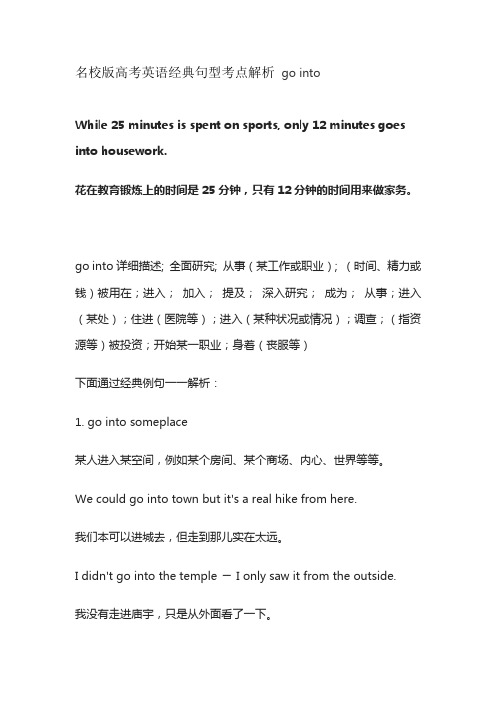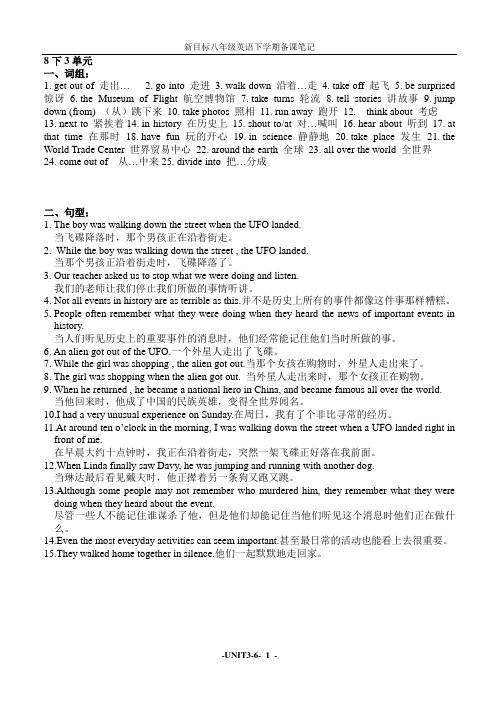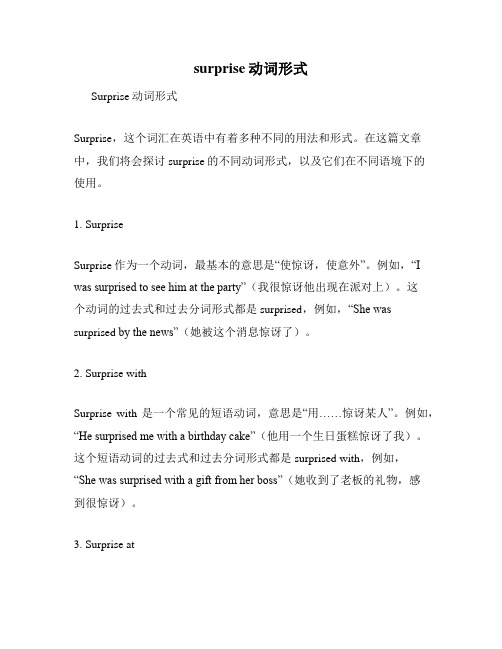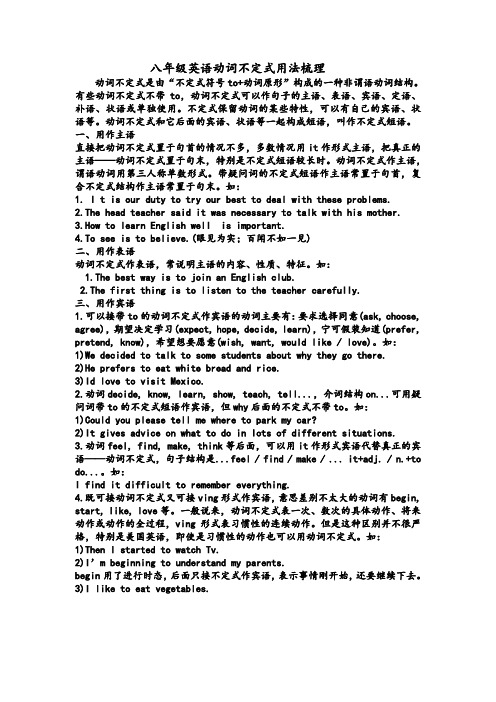短语be surprised, go into用法分析
常见的be动词短语/词组

54. be/get lost
迷失 (道路 )
55. be sure of
对…… 有把握
56. be sure that
确信
57. be sure to do sth . 一定要;务必
58. be worth doing sth . 值得做 ……
59. be busy with 忙于/ be busy doing 忙于做
17. be crowded with
挤满
18. be covered with 盖满 …… ,掩满
19. be stressed out 有压力的 ,紧张的
20. be relaxed (about)
觉得放松
21. be dressed in
穿着 …… 衣服
22. be married to sb . 和某人结婚
对…… 厌烦
12. be fed up with
对…… 极厌烦
13. be embarrassed at 对…… 尴尬
14. be disappointed in sb. 对某人感到失望
15. be disappointed at sth. 对某事感到失望
16. be filled with=be full of 装满/充满
对…… 感到惊讶
6. be impressed by
被…… 感动
7. be interested in
对…… 感兴趣
8. be anxious about
因…… 焦虑
9. be worried about
为…… 感到担忧
10. be shocked at /by 对…… 感到震惊
11. be tired of
高考英语读后续写晨背晚练:13 情感描写之 ”惊讶“

for a string of such items as she was eager to possess.
1. in astonishment 2.A spark of surprise flashed across my mother’s face
3.What shocked me
Seeing that,4.
二、课堂教学务必高效
课堂是教育教学是主阵地。高三年级教学时间紧,教学任务重,更要切实发挥 课堂40分钟的作用。一是上好微专题课。春节前后,一轮复习进入后期,学生 不会的知识点逐步浮出水面。这些薄弱知识点如果解决不好,将直接影响到二 轮复习的效果。高三年级要围绕浮现出来的问题,上好微专题或微微专题课, 针对某一个点或几个点精讲、讲透,触类旁通。微专题课怎么上?可以针对学 生不会的问题,每节课重点解决1-2个知识点,专题强调,专点训练,不贪多, 顺一个点“追祖宗八代”,剖析透!微微专题,则更精、更准、更小、更有效,可 以一节课只讲一道题,但是要把这一道题挖深、挖透,讲透一个会一类,做会 一题能举一反三。
a spark of surprise flashed/passed across one's eyes眼中闪过一丝震 惊(眼)
be seized by shock震惊 throw sb. into astonishment 使某人震惊
☆A look of surprise spread over her face.惊愕的表情在她的脸上蔓延 句 开来。 子 ☆He was thrown into astonishment.他大吃一惊。 赏 ☆ He was too surprised to speak or even to think.他惊讶得说不出话来 析 ,甚至脑子都不灵了.
高考英语必背重点短语总结

高考英语必背重点短语总结高考行将来临,展现自我的时刻:有信心而无惧怕,有动力而无压力,莫紧张无焦虑,答题迅速不忙乱!愿你马到成功,金榜提名!关于高考英语考点有哪些?下面是作者给大家带来的有关的高考英语考点,一起来看看吧!21年高考英语必背重点短语总结1.be surprised at对——感到惊奇;2.be lucky to 碰巧;3.make up编造、补偿;4.be an expert on/in在——方面是专家;5.burn down把——调小,谢绝;6.have/take a look at看一看;7.get sth with sb随身携带;8.have difficulty/trouble (in)doing sth做某事有困难;9.have the idea of有——的动机;10.provide sb with sth/ provide sth for sb给——提供——;11.supply sb with sth/supply sth to sb把——供给;12Xe to大道,共计;13.have no luck/bad luck运气不好;14.be well-known as以——身份而著名;15.be pleased with对——感到中意;16.join the line/queue排队;17.go on a visit to去——参观;18.be angry with sb对某人动气;19.get a wonderful view获得很好的视角;20.work by=controlled by由——控制;21.burn sth down烧毁、烧塌;22Xpare——to/with同——-相比;23.give up舍弃;24.carry out实行;25.take the drug服药;26.be/get used to习惯于;27.call for需要;28.stop/keep/prevent sb from doing sth禁止某人做某事;29.put up张贴,住宿;30.take——for example以——为例;31.shake hands with与——握手;32.get ready for为——做好准备;33.put up one’s hand举手;34.look up查看;35.take pictures/photos of照相;36.hand sth to sb将某物地给某人;37.develop the films/photos冲洗胶卷/相片;38.be popular with sb受某人欢迎;39.fill in填;40.keep up with保持与——同样的速度;41.put on船上、表演;42.be uncertain about对——没有掌控;43.be honoured for由于——而获得赞誉;44.pick up采集、拾起;45.run after追赶、寻求;46.bring up培养,教育;47.be on show在展出;48.make contributions to为——做出奉献;49.think of象棋、推敲;50.fill——with把——里面放满;51.make use of利用;52.offer sb a lift home捎带某人回家;53.clear up=tidy up整理、整理;54.ought to应当;55.take it easy别紧张;56.give first aid实行急救;57.hold up阻挡;58Xe to复原知觉;59.have a day off休假一天;60.be present出席;61.die out灭绝;62.cause damage to对——造成破坏;63.give back归还;64.put sb to the trouble of doing sth麻烦某人做某事;65.apologize to sb for (doing) sth因某事向某人道歉;66.be after寻求;67.get off脱下;68.depend on依靠、相信;69.put down记下;70.do up系紧;71Xe off从——脱落;72.be suitable for合适;73.be anxious about为——而担忧;74.wash away冲走;75.press against one’s foot挤脚;76.be likely to do很有可能;77.get everything back to normal是一切复原正常;78.push over推倒;79.wake up醒来;80.bring down使倒下;81.cut off切断;82.call in召集;83.cut through剪断、穿过;84.take the place of代替;85.see to照管、注意;86.make noise吵闹、发出嘈杂声;87.stare at凝视;88.bend over俯身于——的前方;89.fall over跌倒;90.speed up加速;91.fight for为——而斗争;92.lead to导致;93.praise sb for sth因某事夸奖某人;94.take——-nationality入——国籍;95.be bent on doing sth专心致志地做某事;96Xpare notes商量,交换意见;97.put an end to结束、停止;98.get sth ready准备某东西;99.fold up折叠起来;100.connect to接在——上,连在——-上高考英语必背重点短语总结二:1.make sure肯定;2.find out弄清楚;3.turn off关掉(灯、水龙头、煤气等);4.turn on打开;5.follow one’s instruction听某人的指导;6Xe about产生(近义词come into being; give birth to);7.ask——for——向——要/要求;8.change into变成;9.explain sth to sb想某人说明;10.have a good trip旅途愉快;11.tie——to把——系到——上;12.take off起飞;脱掉;(反义词land .v着陆);13.be made from用——制成(看不出原材料);be made of(看得出原材料);be made into被制成;14.get to 到达=reach=arrive in/at;15.break the rule违背规定;16.knock down撞倒,拆除;17.carry away使入迷,冲走;18.cover with用——覆盖;19.begin/start with以——开始;20.make fun of取笑某人;21.write to给——写信;22.pick up拾起,接收,接送;23.give advice提出建议;24.go with与——相配;25.set free开释;26.break a way from摆脱;27.join up联合;28.be against反对;29.be for支持;30.be tired of sth/doing sth对——厌烦;31.get along/on with进展得——;32.take lies说谎;33.take exercise锤炼;34.look out/be careful/take care当心;35.break out爆发;36.get burnt被烧伤;37.escape from逃跑;38.worry about为——而担忧;39.lose one’s life牺牲;40.collect money for为——捐钱;41.belong to 属于;42.look well看起来气色不错;43.call on sb拜望某人;44.try on试穿;45.pay back偿还;46.lose one’s job失业;47.sound like听起来像;48.keep record保持纪录;49Xe across偶然碰见;50.cut down减少;51.make progress获得进步;52.be forced/obliged/made to被迫;53.go on to do sth接着做另一件不同的事情;54.go on doing接着做同一件事情;55.keep on doing sth连续作某事;56.be sure of/about sth确信,肯定;57.translate——into——把——译成;58.colse with以——结束;59.be puzzled感到困惑不解;60.be separated by被——所分离;61.separate——from把——和——分隔开来;62.die of死于(病、情感、饥寒、年老等身体内部原因);die from死于(受伤、事故、严寒等身体外部原因);63.keep in touch with保持联系;lose touch with失去联系;64.lead/live a life过着——的生活;65.play a part/role in起——的作用,扮演——的角色;66.be fond of爱好;67.get together集会、聚欢;68.feel like doing想要做;69.date from始于、起源于、追溯到;70.be marked with被标上、标明有;71.make every effort尽力;72.be busy doing sth忙于;73.research into研究、分析;74.hang up挂断电话、悬挂;75.knock——out of 把——从——中敲出来、剔除;76.point out指出、说明;77.turn over打翻;78.go against违抗、违背;79.give a talk做报告;80.send out分发;81.ring up给——打电话;82.get through拨电话、完成、通过;83.hold on别挂断21年高考英语必背重点短语总结到此结束。
(完整版)八年级英语下册Unit3知识点总结Couldyoupleasecleanyourroom

Unit3 Could you please clean your room?Peter ,could you please take out the trash?彼得,你能把垃圾倒了吗?Could you please do sth ?请你(做)......好吗?用于提出恳求,希望获得对方的必定回答,说话的语气比较客气委宛。
Could不是can的过去式,是委宛、礼貌的说法。
回答用can.【常用答语】必定回答:Sure./ Of course./ Certainly./No problem.否认回答:Sorry , I can’t2、 take out取出(v+ adv)【注】 : 跟代词做宾语,代词放中间;跟名词做宾语,可放在中间,也可放在后边His teeth hurt badly. The dentist take them out .【短语】 take out the trash倒垃圾take a walk take back回收take place发生take off 3. Can you do the dishes.?那你能够洗盘子吗?do the dishes洗碗漫步脱下;take away腾飞拿走,取走【构造 1 】 do the + 名词:do the dishes/ laundry洗餐具/衣服【构造 2 】 do the + 动词 -ing do the cleaning打扫卫生【构造 3 】 do one ’ s +名词do one ’ s housework/ homework做家务/家庭作业【构造 4 】 do some + 动词 -ing do some reading/ shopping读写书/购物Could I at least finish watching this show?起码让我看完这个节目能够吗?1】 Could I do a sth?我能够做......吗?用于表达恳求,语气比较委宛。
广东省广州地区七年级上学期期末英语试卷精选汇编:单词拼写(含解析)

单词拼写番禺区第一节单词拼写(共5小题;每小题1分,满分5分)根据下列句子及所给单词的首字母写出所缺单词,在填写答卷时.要求写出完整单词,(每空限填一词)28.(1分)We are going to t part in the sports meeting.29.(1分)Guangzhou is a m city in China.30.(1分)It is good for our world to use solar p.It is from the sun.31.(1分)Go a the bridge,and you'll see a garden just in front of you.It's so beautiful.32.(1分)My d is to be an English teacher.第一节单词拼写(共5小题;每小题1分,满分5分)根据下列句子及所给单词的首字母写出所缺单词,在填写答卷时.要求写出完整单词,(每空限填一词)28.【解答】根据所给出的部分句子,结合首字母,可推出是短语" take part in参加",be going to+动词原形.结合句意:我们要去参加运动会.故答案为:take.29.【解答】根据所给出的部分句子,结合首字母,可推出是形容词" 现代的modern".结合句意:在中国广州是一个现代都市.故答案为:modern.30.【解答】根据所给出的部分句子,结合首字母,可推出是名词" 能量power",不可数名词.结合句意:使用太阳能对我们的世界是有好处的,它来自太阳.故答案为:power.31.【解答】根据所给出的部分句子,结合首字母,可推出是介词"穿过across".结合句意:穿过这座桥走,你会看到一个花园就在你面前.它是如此美丽.故答案为:across.32.【解答】根据所给出的部分句子,结合首字母,可推出是名词" 梦想dream",单数形式.结合句意:我的梦想是成为一个英语老师.故答案为:dream.天和区第一节单词拼写(共9小题;每小题1分,满分9分)根据下列句子意思及所给单词的音标或首字母写出句中所缺单词.在填写答卷时,要求写出完整单词.(每空只写一词)8.(1分)I can[ha:dli] work out the questions without your help.9.(1分)We enjoyed[aus:'selvz] when we took a trip last weekend.10.(1分)Please turn off the lights before you[li:v] the classroom.11.(1分)She plans to travel around Asia d the winter holiday.12.(1分)Remember to take your c if you go out to take photos of the flying birds.13.(1分)Children in the north love skiing on s days in winter.14.(1分)She likes listening to English songs in her d life.15.(1分)I asked my mother to t me how to make dumplings.16.(1分)She is so happy to move into a new f with two bedrooms and a big living room.第一节单词拼写(共9小题;每小题1分,满分9分)根据下列句子意思及所给单词的音标或首字母写出句中所缺单词.在填写答卷时,要求写出完整单词.(每空只写一词)8.【解答】根据给出的音标提示[ha:dli],因此可知这句话的意思是"如果没有你的帮助,我几乎不能解出这道题来."故填hardly.9.【解答】根据给出的音标提示[aus:'selvz] ,因此可知这句话的意思是"当上周末我去旅行时,我们都过的很快乐."故填ourselves.10.【解答】根据给出的音标提示[li:v],因此可知这句话的意思是"在你离开教室前,请把所有的灯关掉."故填leave.11.【解答】根据给出的首字母提示,因此可知这句话的意思是"她计划在寒假的时候环游亚洲."故填during.12.【解答】根据给出的首字母提示以及"if you go out to take photos of the flying birds.",因此可知这句话的意思是"如果你出去放风筝的时候想拍照的话,记得带上你的相机."故填camera.13.【解答】根据给出的首字母提示,因此可知这句话的意思是"中国北方的孩子们冬天里喜欢在有雪日子里滑雪."故填snowy.14.【解答】根据给出的首字母提示,因此可知这句话的意思是"她喜欢在日常生活中听英语歌."故填daily.15.【解答】根据给出的首字母提示,因此可知这句话的意思是"我让我的妈妈告诉我如何包饺子."故填tell.16.【解答】根据给出的首字母提示,因此可知这句话的意思是"她很高兴搬进了一个有两个卧室和一个客厅的新公寓."故填flat.荔湾区一、第一节单词填空(共10小题;每小题1分,满分10分)26.(1分)My d is to be a great writer like Mo Yan when I grow up.27.(1分)My school is not far from my home,and I r a sharing bike to school every day.28.(1分)If you love Zhujiang River,don't p it.29.(1分)It is hot and d in summer and very cold and wet in winter in the east of China.30.(1分)Look ! The dog is trying to c the mouse there.31.(1分)The Pudong New Area has many m buildings.32.(1分)Visitors can f the guide to travel around the city.33.(1分)Jim,you are old enough to take care of y.34.(1分)It is a hot summer day,and the sun shines b.35.(1分)My mom is good at planting.There are many beautiful flowers in our g.一、第一节单词填空(共10小题;每小题1分,满分10分)26.【解答】根据My d﹣﹣is to be a great writer like Mo Yan when I grow up及首字母提示,判断句意为我的梦想是长大后成为莫言那样的伟大作家.这里放在my后面跟名词单数形式,dream,名词,梦想.故填dream.27.【解答】根据My school is not far from my home,and I r﹣﹣a sharing bike to school every day及首字母提示,可知我的学校离我家不远,我每天都骑共享单车去上学,从every day 判断句子使用一般现在时,主语是I,谓语动词用动词原形,ride,动词,骑,乘.故填ride.28.【解答】根据If you love Zhujiang River,don't p﹣﹣it及首字母提示,判断句意为如果你爱珠江,不要污染它.这里放在don't后面跟动词原形,pollute,动词,污染.故填polltue.29.【解答】根据It is hot and d﹣﹣in summer and very cold and wet in winter in the east of China 及首字母提示,判断句意是中国东部夏季炎热干燥,冬季寒冷潮湿.放在is后面跟形容词,dry,形容词,干燥的.故填dry.30.【解答】根据Look ! The dog is trying to c﹣﹣the mouse there及首字母提示,判断句意为看!那条狗想在那儿捉老鼠.catch,动词,抓,捉,放在to后面跟动词原形.故填catch.31.【解答】根据The Pudong New Area has many m﹣﹣buildings及首字母提示,判断句意为浦东新区有许多现代化建筑.这里修饰名词用形容词形式,modern,形容词,现代的.故填modern.32.【解答】根据Visitors can f﹣﹣the guide to travel around the city及首字母提示,判断句意为游客可以跟随导游环游城市,follow,动词,跟随,放在情态动词can后面跟动词原形.故填follow.33.【解答】根据Jim,you are old enough to take care of y﹣﹣及首字母提示,判断句意为吉姆,你已经长大了,可以照顾自己了.这里take care of oneself表示照顾自己.故填yourself.34.【解答】根据It is a hot summer day,and the sun shines b﹣﹣及首字母提示,判断句意为这是一个炎热的夏天,阳光明媚.这里修饰动词用副词形式,brightly,副词,明亮地.故填brightly.35.【解答】根据My mom is good at planting.There are many beautiful flowers in our g﹣﹣及首字母提示,判断句意为我妈妈擅长种植,我们花园里有许多美丽的花,放在our后面跟名词形式,garden,名词,花园.故填garden.海珠区第二节单词拼写(共5小题;每小题1分,满分5分)12.(1分)根据下列句子及所给单词的首字母写出所缺单词.(每空限填一词)Look! There is a cinema right a the street.13.(1分)根据音标填写单词,使句意完整We b things to make energy.This pollutes the air.14.(1分)根据音标填写单词,使句意完整My e brother taught me to ride a bike when I was young.15.(1分)根据音标填写单词,使句意完整When the b rings,I run to the playground with my best friends.16.(1分)根据音标填写单词,使句意完整People usually s time with their relatives during the Spring Festival.第二节单词拼写(共5小题;每小题1分,满分5分)12.【解答】根据Look! There is a cinema right a﹣﹣the street及首字母提示,可知看!街对面有一家电影院.这里across the street表示街的对面.故填across.13.【解答】根据We b﹣﹣things to make energy.This pollutes the air及首字母提示,可知这里说的是我们燃烧东西来产生能量.这污染了空气.burn,动词,燃烧,从pollutes判断句子使用一般现在时,这里主语是we,复数形式.故填burn.14.【解答】根据My e﹣﹣brother taught me to ride a bike when I was young及首字母提示,判断这里说的是小时候哥哥教我骑自行车.这里elder brother表示哥哥.故填elder.15.【解答】从I run to the playground with my best friends判断前面说的是铃响了,放在the 后面跟名词形式,bell,名词,铃,后面rings用的是第三人称单数形式,所以前面名词用单数.故填bell.16.【解答】根据People usually s﹣﹣time with their relatives during the Spring Festival及首字母提示,可知人们通常在春节期间与他们的亲戚一起度过.这里spend with表示与…度过,句子用一般现在时,主语是复数.故填spend.番禺区2017-2018学年六、单词拼写(共5小题,满分5分)根据下列句子中文或所给单词的首字母写出所缺单词.(要求写出完整单词)40.Class is over and let's have a(课间休息).41.We are going to take a(旅行)to Hainan Island next month.42.Jim and Lily are(吃惊的)at the news.43.Don't put rubbish into the rivers.That p them.44.She gets up early and n comes to school late.六、单词拼写(共5小题,满分5分)根据下列句子中文或所给单词的首字母写出所缺单词.(要求写出完整单词)40.Class is over and let's have a break(课间休息).【分析】下课了,让我们课间休息.【解答】考查翻译填空.根据汉语提示及其英语句子,可知要翻译的部分为:课间休息.英语表达是have a break,前有冠词a,这里用名词单数.故答案为break.【点评】做这类题型,首先根据所给汉语明确句子所要考查的单词或短语的拼写,掌握短语have a break.41.We are going to take a trip(旅行)to Hainan Island next month.【分析】下个月我们打算去海南岛旅行.【解答】考查翻译填空.根据汉语提示及其英语句子,可知要翻译的部分为:旅行.英语表达是trip,前有冠词a,这里用名词单数.故答案为trip.【点评】做这类题型,首先根据所给汉语明确句子所要考查的单词或短语的拼写,掌握单词trip的书写.42.Jim and Lily are surprised(吃惊的)at the news.【分析】吉姆和莉莉听到这个消息是吃惊的.【解答】考查翻译填空.根据汉语提示及其英语句子,可知要翻译的部分为:吃惊的.英语表达是surprised,be surprised at吃惊某事.故答案为surprised.【点评】做这类题型,首先根据所给汉语明确句子所要考查的单词或短语的拼写,掌握be surprised at吃惊某事.43.Don't put rubbish into the rivers.That p ollutes them.【分析】不要往河里倒垃圾,那样会污染河流.【解答】考查动词第三人称单数.结合语境"不要往河里倒垃圾,那样会__河流"及首字母提示,可知,应该是"污染"pollute.主语that那,一般现在时态,谓语动词用pollute的第三人称单数pollutes.故答案是:pollutes.【点评】实义动词的第三人称单数.通常用于一般现在时态,要结合语境及首字母提示,想出正确的动词,结合主语的单复数变化,运用正确的动词第三人称单数形式完成试题.注意实义动词第三人称单数变化规则.44.She gets up early and n ever comes to school late.【分析】她早起从不迟到.【解答】从She gets up early 及所给首字母,判断后面说的是上学她从不迟到,never,从不.故填never.【点评】首字母填空类型题要充分理解句意,再根据首字母提示完成试题.荔湾区2017-2018学年一、第一节填词(共5小题;每小题1分,满分5分)A.根据句子意思用所给单词的适当形式填空.在答题卷的横线上写出完整单词.25.Every day,Li Ming goes(go)to school by school bus.【分析】每天,李明坐校车上学.【解答】考查动词第三人称单数.句意"每天,李明坐校车上学".every day每天,一般现在时态,主语Li Ming单数,谓语动词用go的第三人称单数goes.故答案是:goes.【点评】实义动词的第三人称单数.通常用于一般现在时态,要结合主语的单复数变化,选择合适的实义动词形式,注意实义动词第三人称单数变化规则.26.The room is too small.There is hardly(hard)any space for us to sit down.【分析】房间太小了,我们几乎没有地方坐下.【解答】考查副词.结合语境"房间太小了,我们___有地方坐下"及所给单词,可知,应该是"几乎不、几乎没有".填hard的副词hardly.故答案是:hardly.【点评】副词通常用来修饰动词或句子,这里修饰动词,要结合语境根据所给提示,辨析副词用法,选择合适答案完成试题.27.Tom is good at swimming(swim)and playing the piano.【分析】汤姆擅长游泳和弹钢琴.【解答】考查动名词.句意"汤姆擅长游泳和弹钢琴".be good at doing sth擅长做某事.介词at后用swim的动名词swimming游泳.故答案是:swimming.【点评】考查动名词.结合语境及提示,掌握固定搭配be good at doing sth擅长做某事.注意动名词变法.28.There is a lot of pollution(pollute)on Earth.【分析】﹣﹣地球上有很多污染.【解答】答案:pollution 考查单词填空.根据题干:There is a lot of(pollute)on Earth.地球上有很多污染.根据句子结构,要用名词,pollute是动词,名词是pollution是不可数名词,故用原形,所以答案是pollution.【点评】考查单词填空.准确的翻译句意及分析句子结构是关键,然后再用合适的形式完成句子.29.I had(have)a picnic with my friends last Sunday.【分析】上星期天我和朋友们去野餐了.【解答】考查动词.句意"上星期天我和朋友们去野餐了".last Sunday上星期天,一般过去时态,谓语动词用have的过去式had.故答案是:had.【点评】动词是表示动作或者是状态的词,要结合语境,注意时态,人称等变化,掌握一些固定搭配.选择合适答案完成试题.B.根据下列句子以及所给单词的首字母写出所缺单词.要求在答题卷规定的横线上写出完整单词.(每空只写一词)30.I love children.My d ream is to be a teacher in a school.【分析】我爱孩子.我的梦想是在学校当老师.【解答】考查名词.结合语境"我爱孩子.我的___是在学校当老师"及首字母提示,可知,应该是"梦想".is单数,主语用单数dream.故答案是:dream.【点评】此题知识点是考查名词.结合语境及首字母提示,在理解句意的基础上,选择合适的名词,注意单复数变化等.31.In autumn,the weather is cool and d ry.【分析】秋天天气是凉爽的和干燥的.【解答】考查形容词.结合语境"秋天天气是凉爽的和__"及首字母提示,可知,应该是"干燥的".is系动词,系表结构,填形容词dry.故答案是:dry.【点评】考查形容词.形容词通常修饰名词或构成系表结构,结合语境及首字母提示,正确写出答案.32.The earth is our home,so we should p rotect it for our future.【分析】地球是我们的家园,所以我们应该为我们的未来保护它.【解答】考查动词.结合语境"地球是我们的家园,所以我们应该为我们的未来__它"及首字母提示,可知,应该是"保护".情态动词should后用动词原形protect.故答案是:protect.【点评】动词是表示动作或者是状态的词,要结合语境及首字母提示,注意时态,人称等变化,掌握一些固定搭配.选择合适答案完成试题.33.Mother is much better now.She is a ble to take a walk outside.【分析】妈妈现在好多了.她能出去散步了.【解答】考查形容词.结合语境"妈妈现在好多了.她__出去散步了"及首字母提示,可知,be able to能.固定搭配.故答案是:able.【点评】考查形容词.结合语境及首字母提示,掌握固定搭配be able to能.就能轻松写出答案了.34.At night,these tall buildings l ight up the sky in every direction.【分析】夜晚,这些高楼大厦照亮了天空的各个方向.【解答】答案:light.考查动词.结合语境"夜晚,这些高楼大厦__天空的各个方向.".及首字母提示,可知,light up照亮.固定搭配.主语buildings复数,一般现在时态,谓语动词用原形light.【点评】首字母填空类型题要充分理解句意,再根据首字母提示完成试题,注意时态,单复数,词性等变化.。
名校版高考英语经典句型考点解析 go into

名校版高考英语经典句型考点解析go intoWhile 25 minutes is spent on sports, only 12 minutes goes into housework.花在教育锻炼上的时间是25分钟,只有12分钟的时间用来做家务。
go into详细描述; 全面研究; 从事(某工作或职业); (时间、精力或钱)被用在;进入;加入;提及;深入研究;成为;从事;进入(某处);住进(医院等);进入(某种状况或情况);调查;(指资源等)被投资;开始某一职业;身着(丧服等)下面通过经典例句一一解析:1. go into someplace某人进入某空间,例如某个房间、某个商场、内心、世界等等。
We could go into town but it's a real hike from here.我们本可以进城去,但走到那儿实在太远。
I didn't go into the temple ─I only saw it from the outside.我没有走进庙宇,只是从外面看了一下。
Let's go into the study and put on some music.我们到书房听点儿音乐吧。
People would go into the store and come out with their arms full.人们到这家商店来总是满载而归。
We used to doll ourselves up and go into town.我们那时常常打扮得漂漂亮亮然后进城去。
He would often rise as soon as it was light and go into the garden.他经常天一亮就起床去花园。
Ted and I took it in turns to go into hospital and sit with Emma.我和特德轮流去医院陪护埃玛。
Unit1 What's the matter 短语总结-背诵版

Unit1What's the matter?短语总结—背诵版一、短语总结1.“(某人)怎么了?”表达(3+2+1+1)1.What’s the matter/trouble/problems(with sb.)?2.What’s wrong/up(with sb.)?3.(Is there)anything wrong(with sb.)?4.What happened to sb.?2.happen(意外地)发生(happen-happened-happened)1.take place(有计划地)发生2.take one’s place=take the place of sb.取代/代替某人的位置3.sth.happen(ed)to sb.某事发生在某人身上4.sb.happen(ed)to do sth.某人碰巧做某事3.“身体部位疼痛or不舒服”的表达(4)1.have a+疾病名词(headache/stomachache/toothache/其他疾病)2.have a sore+身体部位3.身体部位+hurt(s)4.have a pain in the+身体部位4.accident1.accidental adj.意外的accidentally adv.意外地2.by accident=accidentally意外地3.by mistake错误地5.lie1.lie in位于......(内部)2.lie to位于......(相隔海/省)3.lie on位于......(接壤)4.Iie ylie躺;位于lie-lay-lain lying lie down躺下lie on/in/to位于撒谎lie-lied-lied lie to sb.对某人撒谎lie about sth.对某事撒谎lay放置;下蛋lay-laid-laid laying lay down放下6.上下车1.get on/off+a/the bus/plane/train/metro/subway2.get in/into/out of+a/the taxi/car/van7.think v.思考;认为(think-thought-thought)1.think about思考;考虑2.think over=think about carefully仔细考虑3.think of认为;想起What do you think of...?=How do you like...?你认为...怎么样?4.think twice再三考虑;谨慎考虑8.surprise n./v.(surprise-surprised-surprised)1.to one’s surprise令某人吃惊的是2.in surprise=surprisingly吃惊地3.be surprised at对......感到吃惊4.be excited about对......感到激动5.be interested in对......感兴趣9.trouble n.麻烦(不可数)1.have trouble/problems/difficulty(in)doing sth.做某事有麻烦/问题/困难2.get into trouble陷入麻烦3.be in trouble在麻烦中10.fall v./n.(秋天)(fall-fell-fallen)1.fall behind sb.落后某人catch up with sb.赶上某人2.fall in love with sb./sth.爱上...../与......相爱3.fall down掉下4.fall over摔跤5.fall down from...=fall off...从......掉下6.fall asleep睡着11.run v.跑/经营(run-ran-run)1.run after...追赶...2.run away逃跑3.sb.run out of sth.某人用光/耗尽某物4.sth.run out某物花光/耗光5.run a shop/company/restaurant经营一家商店/公司/餐馆e n./v.使用(use-used-used)1.be useful=be of use有用的2.be useless=be of no use没有用的3.be used to(doing)sth.习惯于(做)某事4.be used to do sth.被用来做某事ed to do sth.过去常常做某事13.help n./v.帮助(help-helped-helped)1.help(sb.)to do sth.帮助某人做某事2.help sb.with sth.在某方面帮助某人3.can’t help doing sth.情不自禁/忍不住做某事4.help oneself to sth.自便/自取......(随便吃/喝......)5.with one’s help=with the help of sth.在某人的帮助下6.ask sb.for help=turn to sb.向某人寻求帮助14.own adj.自己的v.拥有(own-owned-owned)owner n.拥有者1.sb.own sth.=sb.be the owner of sth.某人拥有某物2.on one’s own=by oneself=alone独自地3.one’s own+n.(单/复)某人自己的......15.mean v.意思是/打算(mean-meant-meant)adj.刻薄的;吝啬的meaning n.意思;意义meaningful adj.有意义的meaningless无意义的1.mean to do sth.打算做某事2.mean doing sth.意味着做某事16.mind v.介意/在意(mind-minded-minded)n.决心;心智;思想;头脑1.make up one’s mind(to do sth.)下定决心(做某事)2.change one’s mind改变某人的主意3.keep......in mind记住......4.lose one’s mind失去理智;发疯5.in one’s mind=in one’s opinion=in one’s view在某人看来6.mind sb./one’s doing sth.介意某人做某事7.Never mind.(用于安慰)没关系;别担心;不要紧17.cut v.切割/砍(cut-cut-cut)1.cut up=cut...into pieces切碎2.cut off切掉3.cut down砍倒4.cut...in half对半切开18.keep v.保持;继续(keep-kept-kept)1.keep doing sth.保持做某事2.keep sb.doing sth.让某人保持做某事3.keep on doing sth.=go on doing sth.继续做某事4.keep/stop sb.from doing sth.阻止某人做某事19.risk(risk-risked-risked)1.be at risk=be in danger有危险的/在危险中2.take a risk=take risks冒险3.take the risk of sth.=be at the risk of sth.冒着......的风险4.risk doing sth.冒险做某事20.expect v.期待(expect-expected-expected)1.expect(sb.)to do sth.期待(某人)做某事2.expect that从句期待+宾语从句21.sick adj.生病的(定语、表语)ill adj.生病的(只作表语)1.sick-sicker-sickest ill-worse-worst2.be sick of sth.厌烦某事3.be tired of sth.厌倦某事22.breath n.呼吸breathe v.呼吸(breathe-breathed-breathed)1.breathe fresh air呼吸新鲜空气2.hold one’s breath屏住呼吸3.take a deep breath深呼吸4.be out of breath上气不接下气23.ready adj.准备好的1.get/be ready to do sth.准备好做某事2.get/be ready for sth.为......做好准备24.其他短语1.be in control of sth.控制/掌管/管理某事2.take one’s temperature量某人的体温3.take the medicine吃药take pills吃药片4.the rest of sth./sb.剩下的某物/某人5.right away=right now=at once立刻;立即;马上6.get out of...从......出来/离开......。
译林unit5 amazing things Reading-task知识点笔记

Reading1.As usual, they sat down under a big tree.像往常一样,他们坐在了一棵大树下。
as usual 副词短语,意为“照例;像往常一样”,在句中作状语。
as副词,意为“和...一样”;usual形容词,意为“通常的,平常的”我像往常一样起得很早。
___________________________________[拓展]usual的反义词为unusual,意为“不寻常的”;副词为usually,意为“平常地,通常地”e.g: Grandmother told me an unusual story yesterday.祖母昨天给我讲了个不寻常的故事。
2.Suddenly, they heard a whisper from the bushes behind the tree.突然,他们听见了来自树后灌木丛中的耳语声。
①suddenly副词,意为“突然”,可在句首或句中作状语,但在句首时,通常要用逗号隔开[拓展]suddenly的形容词为sudden(突然的;出乎意料的)e.g: His sudden death makes everybody sad.他的突然去世使大家深感悲伤。
②whisper cn.低语They are speaking in whispers .他们在交头接耳。
He whispered to me that he was afraid.他小声和我说他害怕。
bush cn. 灌木丛_____________________ the bushes. 走过灌木丛。
3.They turned around but saw nothing.他们转过身但是什么也没看见。
=They turned around but didin’t see anything.turn around动词短语,意为“转身”,指身体转向和原来方向相反的位置,但是没有走动。
浅谈be+过去分词+介词 短语的创新用法

浅谈be+过去分词+介词短语的创新用法一些短语可以通过改变结构进行创新,成为高考热点、考点,将be+过去分词+介词短词去掉Be做后置定语,宾语补足语或状语,这样的短语常见的有:be interested in 对……感兴趣be pleased with 对……满意be satisfied with 对……满意be crowded with挤满了……be surprised at 对……感到惊讶be devoted to忠诚于……be lost in 沉湎于…… be tired of厌烦……be equipped with配备着……be filled with 装满……例如:后置定语:I don’t like the girl interested in playing computer games我不喜欢对电脑游戏感兴趣的那个女孩。
宾语补足语:Can’t you find the bus crowded with people难道你没有发现这辆公共汽车挤满了人吗?状语:Devoted to his homeland,the old scintist is deeply respected and Loved.因为对祖国忠诚,这位老科学家深受人们的尊敬和爱戴。
高考题型例:1、In thought,he almast ran into the car in front of himALosing BHaving LostC Lost DTo Lose2.Mr smith,ofthespeech ,started toread a novelA tired,boringB tiring,boredC tired , boredD tiringboring3、all kinds of knowledge, he was admitted to a key universityA Equipped withB Having equipped forC Armed forD Having armed with Keys:1-3BAA。
人教版英语八年级上单词Unit9词汇讲解

Unit 9 Can you come to my party ?1. prepare v. 使做好准备;把......准备好prepare-preparing(现在分词要去e)prepare for为......做准备=get ready forprepare sth. 把某物准备好prepare sth. for...为.......准备某物be prepared for 准备prepare sb. for sth.使某人为某事做准备prepare to do sth.=get ready to do sth.准备做某事preparation n. 准备,准备工作make preparations for 准备2. exam n. =examination考试同义词:testan exam一次考试take/have an exam参加考试pass the exam通过考试,考试及格fail the exam考试不及格3. go to the/a doctor 去看医生=go to/see the/a doctor4. flu n. 流行性感冒;流感have the flu患流感表示“患病”的常用短语:have a cold 感冒have a cough 咳嗽have a fever 发烧have a sore throat 喉咙痛/ sore back 背疼have a headache 头痛have a toothache 牙痛have a stomachache 胃痛have a heart problem 心脏病5. available adj. 有空的=free 反义词:busy/fulladj.可获得的;可用的avail v. 有助于,(使)对某人有利拓展:v+able——adj.reliable(可以依靠的)drinkable(可以饮用的)eatable(可食用的)washable(耐洗的,可洗的)drinkable(可饮用的)movable (可移动的)readable(可读的)adjustable(可调节的)adaptable(可适应的)enjoyable(令人愉快的)valuable(有价值的)changeable(可改变的)(un)believable(难以置信的)/(可信的)comfortable(舒适的)reusable(可重复使用的)recyclable(可再循环的)suitable(适合的)acceptable(可接受的)6. another time 其他时间;别的时间on time准时(在规定的时间内完成某个动作)in time及时(指提前到达)at times 有时,时常=sometimes=from time to timeall the time 总是in no time 立刻,很快at a/one time 一次,每一次at the same time 同时at this time of day 在一天中的这个时间once upon a time 从前,很久很久以前have a good/nice/great time 玩得愉快the time=the minute=as soon as 一.......就......by the time 在......以前each time 每次,每当常用句型:What time is it?(=What’s the time?) 几点钟了?It’s time for/to do sth. 到做......的时间了。
surprise的用法

surprise的用法surprise是及物动词,其宾语常是人称代词。
接名词、代词或以现在分词充当补足语的复合宾语。
surprise后接介词at 表示“对…感到惊讶”。
surprise的现在分词和过去分词都可用作形容词,在句中作表语或定语。
surprise在句中还可用作定语。
surprise的用法 11.surprise是及物动词,其宾语常是人称代词。
接名词、代词或以现在分词充当补足语的复合宾语。
2.surprise后接介词at表示“对…感到惊讶”; 后接介词from表示“出其不意使…说了”; 后接介词into表示“出其不意地使人…”; 后接介词with表示“以…使(某人)惊奇”。
3.surprise的现在分词和过去分词都可用作形容词,在句中作表语或定语。
(1)surprise的现在分词作表语时含主动意义,主语一般是物。
常采用以it作形式主语的结构,其真正主语由that引出。
(2)surprise的过去分词作表语时含被动意义,主语一般是人,后接由介词at引导的短语、动词不定式或that/wh-从句,表示“对…感到惊奇”。
4.surprise表示“惊奇,惊讶”,用作不可数名词; 表示“令人吃惊的事物”,用作可数名词。
5.surprise在句中还可用作定语。
surprise的用法 2be surprised about 对〔听到〕…感到吃惊be surprised at 对〔听到〕…感到吃惊be surprised at the news 听了这消息非常诧异surprise sth from sb 出其不意地使某人说出某事surprise sb into tears 出其不意地使人哭起来surprise sth out of sb 出其不意地使某人说出某事surprise sb with a visit 来访使某人感到意外。
超实用高考英语专题复习:专题07 副词高频用法50题 (思维导图+高考真题+仿真模拟) (解析版)

考查副词。句意:对国际舞蹈的兴趣在巴黎尤为明显。修饰形容词evident应用所给词的副词形式。故填especially。
18.(福建省宁德市2023高三期末)Repeating the words in her head before going to bed and_____________(immediate) after waking up has given her fluency in basic conversations with foreigners, she said.
4. undoubtedly。
【解析】
考查副词。句意:山脚下的温泉是你爬山后必须体验的。毫无疑问这会让你放松身心。修饰动词help,用副词形式。undoubtedly毫无疑问地。
5.(2021北京卷)Sam walked her to a nearby convenience store so that she could ___________(safe)wait for the police to take her home.
5. safely
【解析】
考查副词。句意:山姆带她去了附近的一家便利店,这样她就可以安全地等警察带她回家了。修饰动词wait用副词作状语,故填safely。
6. (2021天津卷)As working from home becomes ___________(increasing)common, people are finding it easier to combine parenthood with a full-time career.
【解析】
考查副词。句意:登陆月球的背面是极其有挑战性的。设空处修饰形容词challenging,应使用 extreme的副词形式,故填extremely。
新目标英语八年级下三单元What were you doing when the UFO arrived备课笔记

8下3单元一、词组:1. get out of 走出…2. go into 走进3. walk down 沿着…走4. take off 起飞5. be surprised 惊讶6. the Museum of Flight 航空博物馆7. take turns 轮流8. tell stories 讲故事9. jump down (from) (从)跳下来10. take photos 照相11. run away 跑开12. think about 考虑13. next to 紧挨着14. in history 在历史上15. shout to/at 对…喊叫16. hear about 听到17. at that time 在那时18. have fun玩的开心19. in science 静静地20. take place 发生21. the World Trade Center 世界贸易中心22. around the earth 全球23. all over the world 全世界24. come out of 从…中来25. divide into 把…分成二、句型:1. The boy was walking down the street when the UFO landed.当飞碟降落时,那个男孩正在沿着街走。
2. While the boy was walking down the street , the UFO landed.当那个男孩正沿着街走时,飞碟降落了。
3. Our teacher asked us to stop what we were doing and listen.我们的老师让我们停止我们所做的事情听讲。
4. Not all events in history are as terrible as this.并不是历史上所有的事件都像这件事那样糟糕。
最新人教版九年级英语unit 10语法知识考点内容总结归纳

Unit 10. you are supposed to shake hands.短语归纳:for the first time.初次;首次after all.毕竟;终归to one's surprise.令某人惊讶的是make mistakes.犯错误d r op b y顺便访问;随便进入o n t i m e准时in time及时at the same time同时take off脱下;起飞in exchange for交换go out of one's way特地;格外努力look forward to盼望;期待shake hands握手make friends 交朋友As soon as一......就...... find out查出;查明a bit有点儿;稍微make an effort作出努力table manners餐桌礼仪stick ...into...把...插入... Show up出现;露面show off炫耀用法总结1.be supposed to do sth应该做某事2.plan to do sth计划做某事3.invite sb to do sth邀请某人做某事4.keep sb doing sth使某人一直做某事5.there is no reason for sb to do sth.某人没有理由做某事ed to do sth过去常常做某事7.get/be used to doing sth习惯于做某事8.be used to do sth被用来做某事9.be used for doing sth被用于做某事10.find it+adj+to do sth发现做某事是......11.be expected to do sth被期望做某事12.enjoying doing sth喜欢做某事13.Start doing sth开始做某事14.It is+adj+ to do sth做某事是......重点词汇用法总结1.expect.v.期待;预料expect sth/ sth期待某事/某人expect to do sth期待做某事expect sb to do sth期待某人做某事expect+that从句期待......2.happen.v.发生;碰巧sth happens to sb某人发生了某事Eg: A car accident happened to her this morning.sth happens+时间或地点某事发生在某时或某地Eg: The story happened in 2017.sb happens to do sth某人碰巧做某事I happened to meet a friend of mine in the street yesterday.3.易混辨析happen与take placehappen 指具体客观事件发生,有偶然性,未能预见take place指根据安排或计划发生含有事先预料或准备的意思注意:两者都不用于被动语态Eg: We can't know for sure what will happen.The class meeting will take place this Friday.4.return.v.回应;回报return sth to把某物还给......return to+地点返回某地Eg: Please return the books to the library on time.Allison decided to return home.5.to one's surprise.令某人惊讶的是surprise在此处作名词,意为“惊讶;惊奇”常用短语还有in surprise“惊讶地”give sb surprise “让某人吃惊”。
过去分词短语作状语

过去分词短语作状语非谓语动词是英语语言所特有的语言现象。
其中在学习分词的过程中应该明确,在大多数情况下分词只是从句的一种省略形式,目的在于使语言更为简练,尤其在书面语中。
所以无论是现在分词、还是过去分词都与从句的主动、被动、时态有着密切的关系。
过去分词短语在句中作状语可表示原因、时间、让步、条件、方式或伴随等。
例如:1.Praised by the neighbours, he became the pride of his parents.受到邻居们的表扬,他成为父母的骄傲。
(表示原因)2. Once seen, it can never be forgotten.一旦它被看见,人们就忘不了。
(表示时间)3.Seen from the top of the castle, the park looks very beautiful. (表示条件)从城堡顶端看,公园十分美丽4.Though told of the danger, he still risked his life to entered the cave.虽然被告之有危险,他仍然冒生命危险进山洞。
(表示让步)5.Filled with hopes and fears, he dived deep into the ocean.(表示伴随)心中充满了希望与恐惧,他跳进了深海里。
在使用过去分词作状语时, 为了体现上下两部分(句子层面)的逻辑关系, 句子中常出现过去分词和连词的连带使用,比如例2和例4那样的结构. 通过众多例句分析, 我们发现过去分词作状语以下几种情形:一、句子的主语与作状语用的过去分词之间在逻辑上是被动的关系例:_______ by the beauty of nature, the girl from London decided to spend another two days on the farm .(2004,辽宁)A.Attracting B.Attracted C. To be attracted D.Having attracted分析:答案为B。
surprise动词形式

surprise动词形式Surprise动词形式Surprise,这个词汇在英语中有着多种不同的用法和形式。
在这篇文章中,我们将会探讨surprise的不同动词形式,以及它们在不同语境下的使用。
1. SurpriseSurprise作为一个动词,最基本的意思是“使惊讶,使意外”。
例如,“I was surprised to see him at the party”(我很惊讶他出现在派对上)。
这个动词的过去式和过去分词形式都是surprised,例如,“She was surprised by the news”(她被这个消息惊讶了)。
2. Surprise withSurprise with是一个常见的短语动词,意思是“用……惊讶某人”。
例如,“He surprised me with a birthday cake”(他用一个生日蛋糕惊讶了我)。
这个短语动词的过去式和过去分词形式都是surprised with,例如,“She was surprised with a gift from her boss”(她收到了老板的礼物,感到很惊讶)。
3. Surprise atSurprise at是另一个常见的短语动词,意思是“对……感到惊讶”。
例如,“I was surprised at how well she sang”(我对她唱得这么好感到惊讶)。
这个短语动词的过去式和过去分词形式都是surprised at,例如,“He was surprised at the results of the experiment”(他对实验结果感到惊讶)。
4. Surprise bySurprise by是一个表示“被……惊讶”的短语动词,例如,“I was surprised by the sudden rain”(我被突然的雨淋惊讶了)。
这个短语动词的过去式和过去分词形式都是surprised by,例如,“She was surprisedby the news of her promotion”(她被晋升的消息惊讶了)。
surprised的用法总结

surprised的用法总结在日常英语交流中,surprised是一个常见的词汇,用来形容人们在某些情境下感到惊讶或意外。
本文将对surprised的用法进行总结,并通过实例分析其与相似词汇surprising的区别。
首先,我们需要了解surprised的基本含义。
它表示“感到惊讶的”,通常用来描述某人在面对出乎意料的事件或情况时产生的情感反应。
例如:“当我听到她结婚的消息时,我感到十分惊讶。
(When I heard the news of her marriage, I was quite surprised.)”。
其次,我们需要分析surprised与surprising之间的差别。
这两个词汇都与惊讶有关,但它们的侧重点不同。
surprised是形容词,用来描述人的情感状态,如上文所述。
而surprising则是形容词,用来描述令人生疑或令人惊讶的事物、情况或事件。
例如:“他的才华令人惊讶。
(His talent is astonishing.)”。
接下来,我们通过几个实例来说明surprised在不同语境下的运用。
1.当描述某人对他人行为的惊讶时,如:“她对我告诉她的事实感到惊讶。
(She was surprised by the facts I told her.)”。
2.当描述某人在面对意想不到的结果时,如:“他对自己在比赛中获胜感到惊讶。
(He was surprised to win the competition.)”。
3.当描述某人对意想不到的礼物或消息感到惊讶时,如:“她惊讶地收到了一份豪华度假村的邀请。
(She was surprised to receive an invitation to a luxurious resort.)”。
最后,我们来总结一下surprised的常见搭配和用法。
1.be surprised at/by:表示“对……感到惊讶”。
2.be surprised that:表示“对……感到惊讶”。
surprise的短语有哪些

surprise的短语有哪些surprise表示使惊奇; 突袭的意思,那么你知道surprise的短语有哪些吗?接下来小编为大家整理了surprise的短语搭配,希望对你有帮助哦!surprise的短语:surprise with(v.+prep.)用…使(某人)惊奇 give a surprise of (sth unexpected) with sth They surprised us with a visit.他们突然来访使我们大感意外。
surprise out of(v.+adv.+prep.)出其不意地使某人说出某事 force (sb) to say sth by surprising The court surprised a confession out of the defendant.法庭冷不防使被告招了供。
surprise into(v.+prep.)以出其不意的方式促使…进行force (sb) into (action or doing sth) by surprisingWith an unexpected question, the clever lawyer surprised the prisoner into admission of his guilt.聪明的律师以一个预想不到的问题迫使犯人承认了他的罪行。
surprise by(v.+prep.)以…使(某人)惊奇 give a surprise of (sth unexpected) by doing sthI surprised everyone by wearing a terrible mask.我带了一副可怕的面具,使大家受惊了。
He surprised us by producing from his pocket a five-pound note.他从口袋中取出一张5英镑的纸币,这使我们感到意外。
八年级英语动词不定式用法梳理

八年级英语动词不定式用法梳理动词不定式是由“不定式符号to+动词原形”构成的一种非谓语动词结构。
有些动词不定式不带to,动词不定式可以作句子的主语、表语、宾语、定语、补语、状语或单独使用。
不定式保留动词的某些特性,可以有自己的宾语、状语等。
动词不定式和它后面的宾语、状语等一起构成短语,叫作不定式短语。
一、用作主语直接把动词不定式置于句首的情况不多,多数情况用it作形式主语,把真正的主语——动词不定式置于句末,特别是不定式短语较长时。
动词不定式作主语,谓语动词用第三人称单数形式。
带疑问词的不定式短语作主语常置于句首,复合不定式结构作主语常置于句末。
如:1. I t is our duty to try our best to deal with these problems.2.The head teacher said it was necessary to talk with his mother.3.How to learn English well is important.4.To see is to believe.(眼见为实;百闻不如一见)二、用作表语动词不定式作表语,常说明主语的内容、性质、特征。
如:1.The best way is to join an English club.2.The first thing is to listen to the teacher carefully.三、用作宾语1.可以接带to的动词不定式作宾语的动词主要有:要求选择同意(ask, choose, agree),期望决定学习(expect, hope, decide, learn),宁可假装知道(prefer, pretend, know),希望想要愿意(wish, want, would like / love)。
如:1)We decided to talk to some students about why they go there.2)He prefers to eat white bread and rice.3)Id love to visit Mexico.2.动词decide, know, learn, show, teach, tell...,介词结构on...可用疑问词带to的不定式短语作宾语,但why后面的不定式不带to。
